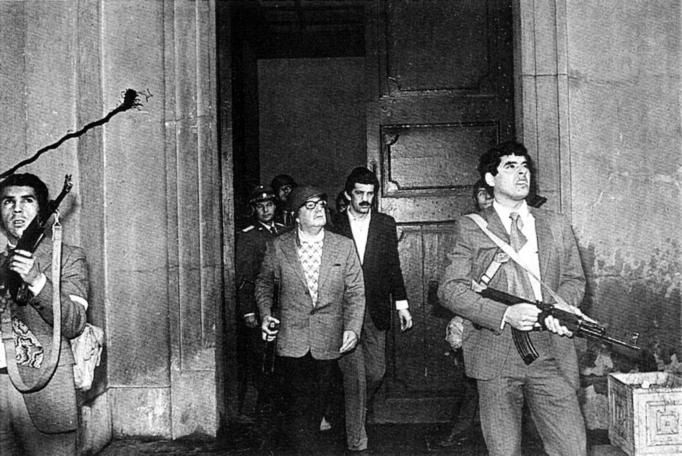
Chile's armed forces stage a coup d'état against the government of President Salvador Allende, the first democratically elected Marxist leader in Latin America. Allende retreated with his supporters to La Moneda, the fortress-like presidential palace in Santiago, which was surrounded by tanks and infantry and bombed by air force jets. Allende survived the aerial attack but then apparently shot himself to death as troops stormed the burning palace, reportedly using an automatic rifle given to him as a gift by Cuban dictator Fidel Castro.
The U.S. government and its Central Intelligence Agency (CIA) had worked for three years to foment a coup against Allende, who was regarded by the Nixon administration as a threat to democracy in Chile and Latin America. Ironically, the democratically elected Allende was succeeded by the brutal dictator General Augusto Pinochet, who ruled over Chile with an iron fist for the next 17 years.

Salvador Allende Gossens was born into an upper-middle-class Chilean family in 1908. He became a Marxist activist and worked as a doctor and in 1933 was a founding member of Chile's Socialist Party. Elected to the Chamber of Deputies in 1937, he later served as minister of health in the leftist government of President Pedro Aguirre Cerda. In 1945, he became a senator. He unsuccessfully ran for president several times in the 1950s and 1960s, and in September 1970 won a three-sided presidential race with 36.3 percent of the vote. Because he lacked a popular majority, his election had to be confirmed by the Chilean Congress.
After the victory of Allende and his leftist coalition, U.S. President Richard Nixon summoned CIA Director Richard Helms to the White House and ordered him in no uncertain terms to prevent Allende from coming to power or to unseat him. Allende, after all, had threatened to nationalize U.S.-owned industries in Chile, and Nixon did not want another Fidel Castro coming to power in an American hemisphere during his watch. President Nixon authorized $10 million for the covert operation against Allende and instructed that it be carried out without the knowledge of the U.S. embassy in Chile.
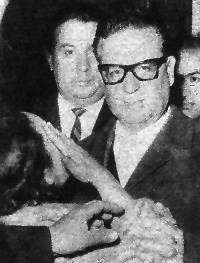
With its mandate from Washington, the CIA attempted to bribe, coerce, and blackmail Chile's Congress and military into denying Allende the presidency, launched an international campaign of disinformation against Allende, and paid a right-wing general to assassinate General Rene Schneider, the chief of Chile's armed forces. Although a conservative, Schneider was staunchly opposed to a coup or any other military interference in Chile's democratic processes. He was murdered by a gang led by right-wing General Roberto Viaux. One month later, the group received a check for $35,000 from the CIA. Years later, the CIA would claim it only wanted Schneider kidnapped.

With only one week remaining before the Chilean Congress was to vote on Allende's election, CIA headquarters sent a cable to its Chilean office that read: "It is firm and continuing policy that Allende be overthrown by a coup. It would be much preferable to have this transpire prior to 24 October but efforts in this regard will continue vigorously beyond this date."

After a heated debate in the Chilean Congress, the mostly conservative body decided to confirm Allende's election on October 24 after he promised support of 10 libertarian constitutional amendments. In spite of U.S. opposition, respect for Chile's democratic tradition–the oldest in Latin America–had won out over ideological hysteria. A few days later, a bungled coup by a group of Chilean military officers helped to rally the country around Allende, who was inaugurated on November 3.

In his nearly three years as Chilean president, Allende worked to restructure Chilean society along socialist lines while retaining democratic government and respecting civil liberties and the due process of law.

Meanwhile, the CIA worked to destabilize Allende's government, spending a total of $8 million on the effort. Opposition groups received funding from the CIA, anti-Allende propaganda efforts continued, strikes were instigated in key sectors of the Chilean economy, and CIA agents maintained close contact with the Chilean military. However, the real cause of the 1973 coup against President Allende was not the insidious activities of American spies but rather the U.S.-led international backlash against his economic policies, which had a disastrous effect on the Chilean economy.

In 1971, President Allende began nationalizing foreign businesses in Chile, including U.S.-owned copper mines--Chile's main source of protection--and a large U.S.-run telephone company. Nixon was outraged, and he created an interagency task force to organize economic reprisals against Chile. The task force plotted steps to sink the world price of copper and ordered a complete ban on U.S. economic aid. The World Bank was successfully pressured to end all loans to Chile, and the Export-Import Bank and the Inter-American Development Bank likewise turned their back on the country. Meanwhile, other foreign investment in Chile dried up out of fears of nationalization.
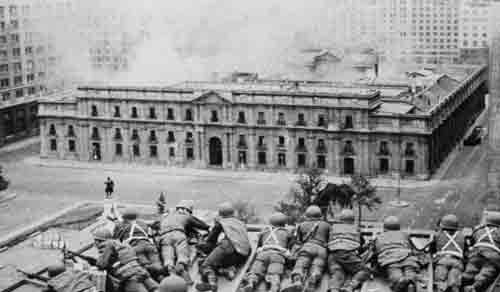
By 1973, the Chilean economy was in shambles. Inflation, labor strikes, and food shortages were rampant, and violence between the right and the left became a daily occurrence. President Allende still had the support of many workers and peasants, but the middle class was united in opposition to him. There was open talk of an impending military coup, and conspirators needed little help from the CIA to put it in motion. The CIA, however, was informed of the planned coup in advance, and on September 10 this information was passed on to President Nixon.
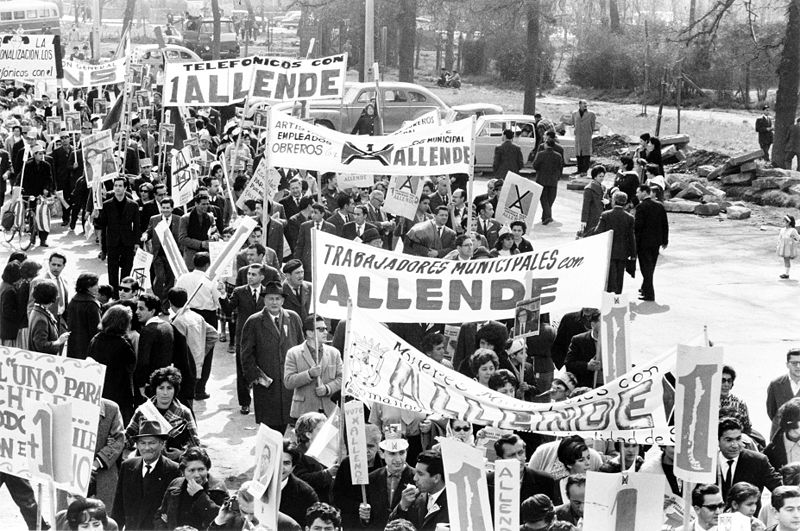
The next day–September 11, 1973–Chile's three armed forces launched a concerted attack against Chile's democratic government. Allende gathered with his loyal presidential guard at La Moneda, the presidential palace. He was photographed inspecting the palace's defenses, rifle in hand. Tanks and troops surrounded La Moneda, and Allende and his supporters were ordered to surrender by 11 a.m. or face attack by the Chilean air force. Allende refused.

At 11 a.m., via telephone, Allende's voice was broadcast over Radio Magallanes, the Communist Party radio station. "I can only say this to the workers: I will not resign," he declared. "With my life I will pay for defending the principles dear to our nation. I have faith in Chile and its destiny. Other men will overcome this gray and bitter moment where betrayal threatens to impose itself. Continue knowing, all of you, that much sooner than later, the great avenues will open through which will pass free men in order to construct a better society. These are my last words having the certainty that this sacrifice has not been in vain."

Just before noon, two fighter jets flew over Santiago and descended on La Moneda, firing rockets with pinpoint accuracy through the doors and windows of the north side of the palace. Six more attack waves came during the next 20 minutes. The palace was in flames, but Allende survived in a wing of the building. Sometime around 2 p.m., Allende allegedly died by placing his rifle under his chin and firing. Reportedly, a gold metal plate affixed to the stock of the gun had an inscribed message that read, "To my good friend Salvador Allende from Fidel Castro."

A few weeks later, Fidel Castro would tell the Cuban people that Allende died while advancing on army troops and firing his gun. The fascist soldiers, Castro said, cut him down in a hail of bullets. This account was taken up by many supporters of Allende and persists in various forms to this day. However, Allende's personal surgeon reported having seen the president shoot himself with the rifle, and a 1990 autopsy of Allende's remains confirmed that he died from a single shot that shattered his skull.

In the aftermath of the coup, General Augusto Pinochet Ugarte, commander in chief of the armed forces, became dictator of Chile. He rounded up hundreds of Allende's supporters, including two American citizens, and had them tortured and executed. The United States immediately offered military and economic aid to the new ruler of Chile–"the savior of democracy"–and the CIA may have helped him identify and capture dissidents. In his 17 years of repressive authoritarian rule, more than 3,000 political opponents were assassinated or "disappeared." His assassination squads were also active outside Chile, and in 1976 Orlando Letelier, Allende's former defense minister, was killed by a car bomb in Washington, D.C.



In 1988, Pinochet agreed to a national referendum on the future of Chile, and a majority of Chileans rejected the continuation of his dictatorship. Democratic elections were held in 1989, and in 1990 Pinochet stepped down as President Patricio Aylwin Azócar was sworn in as Chile's new leader. That year, Salvador Allende's remains were exhumed and given an official burial.
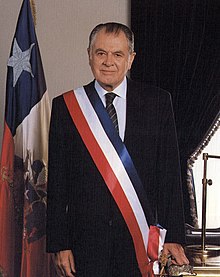
Pinochet remained head of Chile's armed forces until 1998, whereupon he was made a "senator-for-life." That October, during a trip to Britain, he was arrested after Spain sought his extradition for his execution of Spanish nationals. Under pressure from prosecutors in Europe, U.S. President Bill Clinton ordered the CIA and other U.S. agencies to declassify all documents concerning their operations in Chile during the early 1970s. The CIA refused to release many of the documents, however, citing fears that they would reveal operational methods still in use around the world by the CIA.

After a long legal tug of war, Britain's home secretary declared in January 2000 that the 84-year-old Pinochet was unfit to stand trial and ordered him sent back to Chile. Back in Chile he resigned his senatorial seat in 2002 after a Supreme Court ruling that he could not stand trial based on his failing health. Then, in May 2004, Chile's supreme court finally ruled that he was capable of standing trial. In December 2004 he was charged with several crimes.
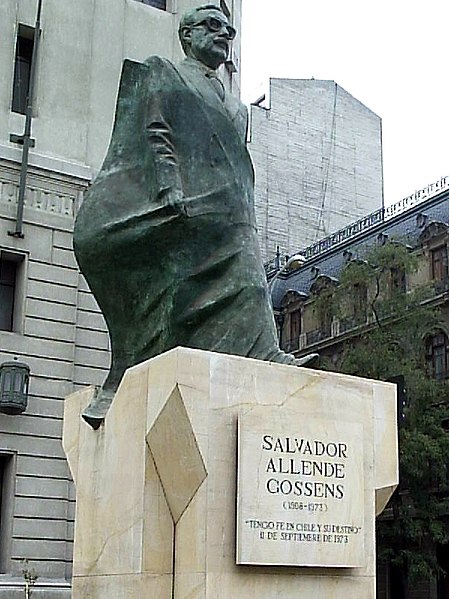
Taken from: http://www.history.com/this-day-in-history/allende-dies-in-coup [11.09.2013]


No comments:
Post a Comment